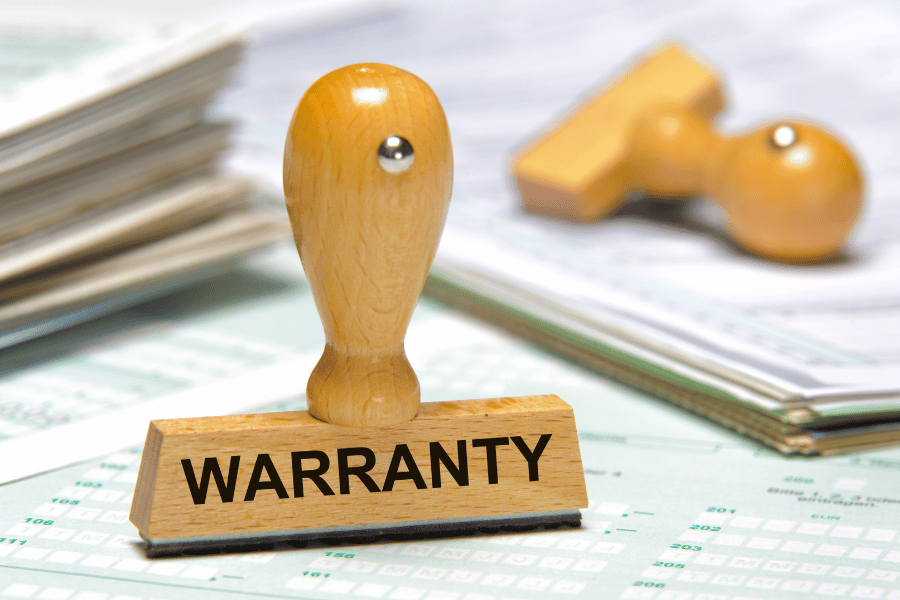Pros and Cons of Home Warranties
Are you considering home warranties and want to weigh the pros and cons? Here's everything you need to know to help you decide if purchasing a warranty is right for you.
When you buy a new or pre-owned home, you're likely to encounter offers for a home warranty. Although it may seem like a solid financial safety net, it's essential to recognize that it may not always live up to homeowners' expectations.
To gauge the worth of a home warranty, it's crucial to have a clear understanding of what it covers and what it doesn't. Depending on your home and circumstances, the benefits of these service contracts may or may not justify the expense.
Home warranty plans cover some home systems and appliances when they fail due to natural wear and tear, but you'll still be responsible for some of the repair costs. It's important to remember that a home warranty only covers what is explicitly stated in the contract. Providers typically offer a range of home warranty plans that cover a selection of appliances, home systems, or both.
Understanding aspects like home warranties is indispensable for homeowners. Being aware of potential costs and repairs can make a significant impact. Whether you're buying a new or an older home, carefully evaluating the pros and cons of home warranties can equip you with a better understanding.
Here are the pros and cons of home warranties.
1. Home Warranties
A home warranty is distinct from homeowners insurance, which covers major perils such as fires, hail, property crimes, and certain types of water damage that could impact the entire structure or the homeowner's possessions.
A home warranty is a contract between a homeowner and a home warranty company that provides discounted repair and replacement service on a home's major components, such as the furnace, HVAC, plumbing, and electric systems. A home warranty may also cover appliances like washers and dryers, refrigerators, and pools.
Homeowners insurance often doesn't cover these things, or the cost of fixing them wouldn't meet the policy deductible. Most plans have a basic component that provides certain coverages to all homeowners who purchase a policy. Homeowners can also purchase one or more optional components that provide additional coverage for an additional cost.

Home warranties are frequently discussed during a home purchase. The seller may offer to purchase one on your behalf to provide peace of mind that any component of the home can be fixed affordably. You will likely receive numerous mail solicitations post-sale to purchase a home warranty.
When considering home warranties, it's important to carefully consider the pros and cons to see if they align with your needs. As a homeowner, you're constantly making impactful decisions, so it's essential to understand that home warranties represent a significant investment in your life. Your peace of mind and your home's protection are worth considering.
2. Pro: Peace of Mind
A home warranty is essential for providing peace of mind through protection against unexpected repair or replacement costs for specific appliances and systems in your home. It is a valuable investment for homeowners on a fixed budget or concerned about the high costs of repairs and replacements.
It's a risk worth taking; losing $300 probably won't devastate your household budget, making it a small price to pay for shielding yourself from substantial financial loss. A home warranty offers crucial protection against these expenses and is especially vital for those worried about the financial burden.
Investing in a home protection plan is crucial for safeguarding your finances against costly and unexpected home repairs. Potential repair and replacement expenses weigh heavily on homeowners, so having a warranty in place is non-negotiable for peace of mind.
3. Pro: Flat Rates Save Money
As a new homeowner, it's crucial to rely on the home inspection team to thoroughly report on the condition of kitchen appliances, the washer and dryer, the water heater, and other vital components. However, even a highly recommended home inspector might overlook issues that could lead to costly repairs. By securing a home warranty, you can confidently save significant money by leveraging flat-rate fixes.
With flat-rate fixes, your service provider commits to making repairs or replacements for a predetermined amount of money. For instance, if your policy states that you only need to pay $100 for repairs, your warranty will prove invaluable when facing a job that would otherwise cost several hundred or even thousands of dollars.
4. Pro: Coverage for Older Appliances
Home warranties reliably cover appliances and systems beyond their manufacturer warranty period. This is particularly beneficial for homeowners with older appliances, as they are more prone to breakdowns and require repairs.
Moreover, home warranties consistently provide convenience to homeowners by efficiently handling the process of finding a qualified service provider to perform repairs or replacements. This significantly saves the homeowners the time and effort of independently researching and contacting service providers.

5: Pro: Multiple Coverage Plans
A home warranty is essential for homeowners as it allows them to budget for home maintenance and repairs with a predictable annual cost for coverage. It is especially vital for homeowners on a fixed budget or those lacking the financial resources to cover unexpected repair or replacement costs. With various plans available, homeowners can select the level of coverage that best meets their needs and budgets.
Overall pros of home warranties:
- Peace of mind: Knowing something will fix if it breaks in your home
- Financial planning: With a home warranty, there are fewer costs
- Ease of repair: For those who are not handy or do not want to spend time searching for a reputable contractor
6. Con: Get More Coverage Than You Need
A home warranty is essentially a service contract with features that resemble those of insurance. The crucial similarity is that you can only reap the benefits when you actually need to utilize your policy.
If you don't need repair services during the contract period, you might consider purchasing a warranty a waste of money. Nevertheless, remember that most warranties are priced at only $300 to $500 per year, so it's up to you to decide if you're willing to potentially lose some money.
It's essential to understand that home warranties do not cover pre-existing conditions, animal infestations, or recalled products. Take the time to thoroughly review and comprehend the coverage during the "free look" period. This ensures that you can secure a 100% refund if you are dissatisfied.

7. Con: Policy Must Belong to the Homeowner
Home warranties exclusively cater to homeowners and do not offer renters protection. Regrettably, renters typically lack the financial leeway of homeowners. Therefore, reviewing the lease agreement to understand any potential financial obligations for replacing appliances and HVAC systems due to normal wear and tear is very important.
8. Con: Exclude Some Repairs
Home warranties typically do not cover acts of nature or God. If your home floods or a tree crashes through your roof, your warranty will unlikely cover those repairs. Unfortunately, these are some of the most expensive repairs you may need for your home.
9. Con: Choose Between Repair Companies
Home warranty companies often collaborate with home repair businesses through contracts with repair professionals to help manage costs for the company providing your home warranty. This system mirrors homeowners insurance, where sticking with the network yields the most savings.
Although saving money matters, some individuals prefer more control over selecting repair professionals. Limiting choices to a small list of contractors may result in none being suitable. To prevent this, thoroughly researching the warranty company's contractors in advance is crucial.
If the list doesn't satisfy you, it's advisable to reconsider purchasing the warranty. Your peace of mind is essential, and we want to make sure that the home warranty matches your preferences and needs.

10. Con: May Cover Repairs Instead of Replacements
Contractors aim to spend as little time and money on your home as possible, so they may opt to repair issues rather than replace damaged items like air conditioners and electrical systems. However, repairs may not always provide lasting solutions, leading to potential future expenses.
Overall Cons:
- Coverage limits: Provided coverage limits often don't fully cover the replacement cost of certain items, so you have to pay the rest out of pocket
- Fine print: Details of coverage limits may be listed in fine print and are overlooked
- Service limitations: Some companies only allow certain brands when replacing items, do not cover commercial grade appliances, or choose your own contractors
11. Home Warranty Coverage?
If you are trying to decide whether or not you need a home warranty, here are some things home warranties cover and what they do not cover to help you make the decision.
Cover
A home warranty typically covers significant home systems and appliances. The exact coverage will depend on the specific home warranty provider and the plan you choose, but typically, the items covered are:
- HVAC systems
- Plumbing and electrical systems
- Kitchen Appliances
- Laundry appliances
- Water heaters
- Garbage disposals
- Ceiling fans
- Garage door openers
Keep in mind that home warranties do not cover pre-existing conditions or items that have been improperly maintained or installed. Be sure to thoroughly read all the fine print before purchasing a home warranty, as some plans may limit coverage amounts and service fees.
Not Cover
Home warranties generally do not cover all household items or causes of damage. Some of the most common exclusions you will find in home warranty contracts are:
- Damage from pre-existing conditions
- Cosmetic damage
- Damaged by acts of nature
- Home modifications
- Lack of maintenance
- Commerical-grade appliances
- Mismatched systems
- Under manufacturer warranty
- Usual wear and tear resulting in misuse
Ensure that you thoroughly review your home warranty policy to understand the inclusions and exclusions within your plan clearly.
Methodology
We used information from different sources and our data to create this guide on the pros and cons of home warranties. We combined various data sets to help you learn more about them.
The following are a few sources we used to gather most of our information about the pros and cons of home warranties.
FAQS
What are the disadvantages of home warranties?
Some disadvantages are that some warranty companies impose dollar limits per repair, require a service call fee for each issue, can deny claims if items are not properly maintained, and cannot determine whether to fix or replace the system or item.
Is having a home warranty worth it?
Home warranties from reputable companies are definitely worth it for most homeowners, as they provide peace of mind and cover your expensive appliances and systems. When your system or appliance breaks down, you only owe a small fee instead of thousands of dollars.
What is the biggest benefit of a home warranty?
A home warranty's most important advantage is its financial protection. It covers the costs of repairing or replacing major home systems and appliances, shielding homeowners from unexpected and significant expenses.

Pros and Cons of Home Warranties - The Bottom Line
When it comes to protecting your home and ensuring peace of mind, home warranties can be a valuable asset. They provide added protection against the unexpected costs of repairing or replacing appliances and systems. However, before making a decision, it's essential to thoughtfully evaluate the cost, coverage, and any limitations of the warranty to ensure it aligns with your needs.
As responsible homeowners, it's important to consider the advantages and disadvantages of home warranties carefully. Your home is a significant investment, and understanding the impact of such decisions is crucial.
Gaining a thorough understanding of home warranties is vital for all homeowners. By being aware of potential costs and repairs, you can make informed decisions that positively impact your home's well-being. Whether you're a new homeowner or have been in your home for years, taking the time to evaluate home warranties thoroughly will lead to a better understanding and enable you to make the best choice for your home.
If you are considering moving or selling, contact us or visit our website. Our team at Raleigh Realty is here to help you with any home buying or selling needs.


